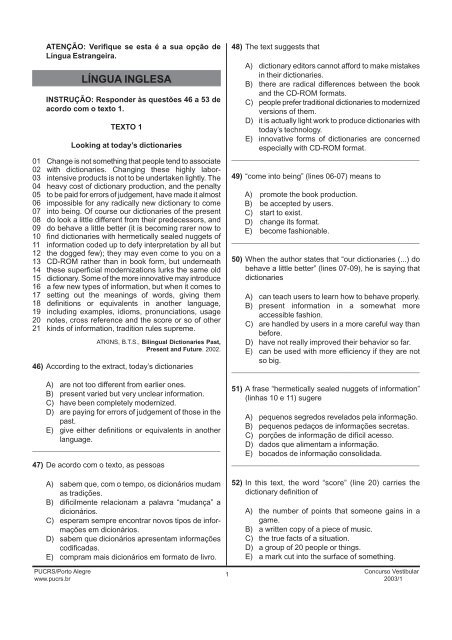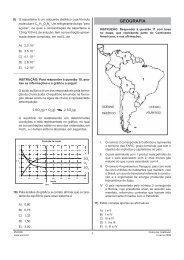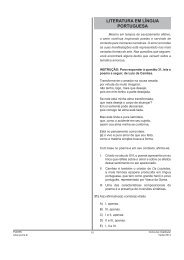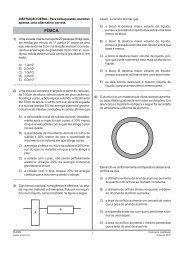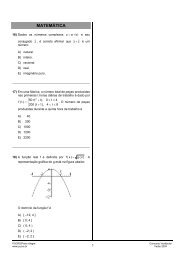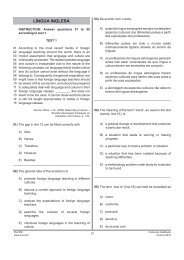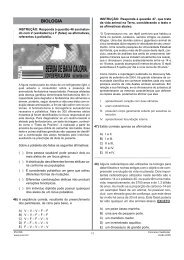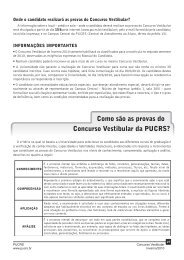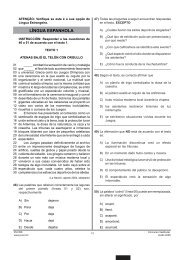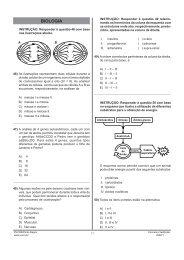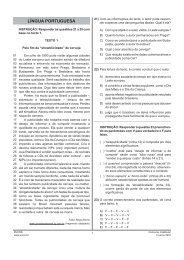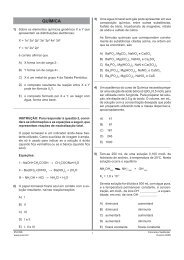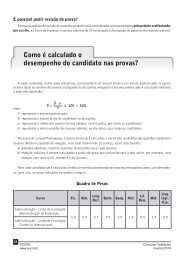LÃngua Inglesa - pucrs
LÃngua Inglesa - pucrs
LÃngua Inglesa - pucrs
You also want an ePaper? Increase the reach of your titles
YUMPU automatically turns print PDFs into web optimized ePapers that Google loves.
01<br />
02<br />
03<br />
04<br />
05<br />
06<br />
07<br />
08<br />
09<br />
10<br />
11<br />
12<br />
13<br />
14<br />
15<br />
16<br />
17<br />
18<br />
19<br />
20<br />
21<br />
ATENÇÃO: Verifique se esta é a sua opção de<br />
Língua Estrangeira.<br />
LÍNGUA INGLESA<br />
INSTRUÇÃO: Responder às questões 46 a 53 de<br />
acordo com o texto 1.<br />
TEXTO 1<br />
Looking at today’s dictionaries<br />
Change is not something that people tend to associate<br />
with dictionaries. Changing these highly laborintensive<br />
products is not to be undertaken lightly. The<br />
heavy cost of dictionary production, and the penalty<br />
to be paid for errors of judgement, have made it almost<br />
impossible for any radically new dictionary to come<br />
into being. Of course our dictionaries of the present<br />
do look a little different from their predecessors, and<br />
do behave a little better (it is becoming rarer now to<br />
find dictionaries with hermetically sealed nuggets of<br />
information coded up to defy interpretation by all but<br />
the dogged few); they may even come to you on a<br />
CD-ROM rather than in book form, but underneath<br />
these superficial modernizations lurks the same old<br />
dictionary. Some of the more innovative may introduce<br />
a few new types of information, but when it comes to<br />
setting out the meanings of words, giving them<br />
definitions or equivalents in another language,<br />
including examples, idioms, pronunciations, usage<br />
notes, cross reference and the score or so of other<br />
kinds of information, tradition rules supreme.<br />
ATKINS, B.T.S., Bilingual Dictionaries Past,<br />
Present and Future. 2002.<br />
46) According to the extract, today’s dictionaries<br />
A) are not too different from earlier ones.<br />
B) present varied but very unclear information.<br />
C) have been completely modernized.<br />
D) are paying for errors of judgement of those in the<br />
past.<br />
E) give either definitions or equivalents in another<br />
language.<br />
_________________________________________________<br />
47) De acordo com o texto, as pessoas<br />
A) sabem que, com o tempo, os dicionários mudam<br />
as tradições.<br />
B) dificilmente relacionam a palavra “mudança” a<br />
dicionários.<br />
C) esperam sempre encontrar novos tipos de informações<br />
em dicionários.<br />
D) sabem que dicionários apresentam informações<br />
codificadas.<br />
E) compram mais dicionários em formato de livro.<br />
48) The text suggests that<br />
A) dictionary editors cannot afford to make mistakes<br />
in their dictionaries.<br />
B) there are radical differences between the book<br />
and the CD-ROM formats.<br />
C) people prefer traditional dictionaries to modernized<br />
versions of them.<br />
D) it is actually light work to produce dictionaries with<br />
today’s technology.<br />
E) innovative forms of dictionaries are concerned<br />
especially with CD-ROM format.<br />
_________________________________________________<br />
49) “come into being” (lines 06-07) means to<br />
A) promote the book production.<br />
B) be accepted by users.<br />
C) start to exist.<br />
D) change its format.<br />
E) become fashionable.<br />
___________________________________________________<br />
50) When the author states that “our dictionaries (...) do<br />
behave a little better” (lines 07-09), he is saying that<br />
dictionaries<br />
A) can teach users to learn how to behave properly.<br />
B) present information in a somewhat more<br />
accessible fashion.<br />
C) are handled by users in a more careful way than<br />
before.<br />
D) have not really improved their behavior so far.<br />
E) can be used with more efficiency if they are not<br />
so big.<br />
_________________________________________________<br />
51) A frase “hermetically sealed nuggets of information”<br />
(linhas 10 e 11) sugere<br />
A) pequenos segredos revelados pela informação.<br />
B) pequenos pedaços de informações secretas.<br />
C) porções de informação de difícil acesso.<br />
D) dados que alimentam a informação.<br />
E) bocados de informação consolidada.<br />
_________________________________________________<br />
52) In this text, the word “score” (line 20) carries the<br />
dictionary definition of<br />
A) the number of points that someone gains in a<br />
game.<br />
B) a written copy of a piece of music.<br />
C) the true facts of a situation.<br />
D) a group of 20 people or things.<br />
E) a mark cut into the surface of something.<br />
PUCRS/Porto Alegre<br />
1<br />
Concurso Vestibular<br />
www.<strong>pucrs</strong>.br 2003/1
53) “tradition rules supreme” (linha 21) significa<br />
A) as regras tradicionais têm supremacia.<br />
B) a tradição suprema das leis.<br />
C) a tradição reina com supremacia.<br />
D) as leis superiores da tradição.<br />
E) as regras superam a tradição.<br />
__________________________________________________<br />
01<br />
02<br />
03<br />
04<br />
05<br />
06<br />
07<br />
08<br />
09<br />
10<br />
11<br />
12<br />
13<br />
14<br />
15<br />
16<br />
17<br />
18<br />
19<br />
20<br />
21<br />
22<br />
INSTRUÇÃO: Responder às questões de 54 a 60<br />
com base no texto 2.<br />
TEXTO 2<br />
Getting reddy<br />
As autumn arrives in the northern hemisphere, the season’s<br />
colour for trees is red, again. Researchers are beginning<br />
to understand why leaves sport it.<br />
Shelley poetically imagined that in autumn leaves lost their<br />
colour as the wild west wind drove them…<br />
…like ghosts from an enchanter fleeing…<br />
Well, that is one hypothesis. But it is unlikely to stand up to<br />
scientific scrutiny. And a surprising amount of such scrutiny<br />
is being devoted to the question of why trees turn such<br />
glorious colours.<br />
In deciduous woodland, the first signs of approaching<br />
autumn are written across the forest in shades of yellow<br />
and orange. Lower temperatures and shorter days trigger<br />
the breakdown of chlorophyll – the green molecule that<br />
captures energy from light in the process of photosynthesis.<br />
As the chlorophyll is removed, it reveals other pigments<br />
that have been swamped by its bold colour. These are called<br />
caratenoids. They aid the process of absorption and, in<br />
chlorophyll’s absence, give rise to pale and brilliant yellows,<br />
ambers, golds and oranges. Different species of tree retain<br />
different amounts of caratenoids, which leads to much of<br />
the polychromatic beauty of a forest in autumn.<br />
(Economist.com Oct 10,2002)<br />
56) The expression “sport it” (line 03) can be replaced in<br />
this context – without a change in meaning – by<br />
A) hold it.<br />
B) play it.<br />
C) leave it.<br />
D) turn it.<br />
E) wear it.<br />
__________________________________________________<br />
57) The suffix ER may be found with the same meaning<br />
as in “enchanter” (line 06) in<br />
A) Researchers (line 02).<br />
B) Lower (line 13).<br />
C) shorter (line 13).<br />
D) other (line 16).<br />
E) ambers (line 20)<br />
____________________________________________________<br />
58) Por ... “it is unlikely to stand up to scientific scrutiny”<br />
(linhas 07 e 08), entende-se que<br />
A) nenhum escrutínio seria aceito por essa hipótese.<br />
B) ninguém gostaria que um escrutínio científico fosse<br />
feito.<br />
C) é improvável que um cuidadoso estudo científico<br />
seja montado.<br />
D) essa hipótese dificilmente passaria por uma investigação<br />
científica.<br />
E) hipóteses desse tipo não são aprovadas para uma<br />
apuração científica.<br />
_________________________________________________<br />
59) The word “breakdown” (line 14) is NOT correctly used<br />
in<br />
54) The question that CANNOT be answered with the<br />
information given in the text is<br />
A) Why do trees display different colors in autumn?<br />
B) What are the pigments responsible for the autumn<br />
colors called?<br />
C) What initiates the decomposition of chlorophyll?<br />
D) What is revealed by the absence of chlorophyll?<br />
E) What elements compose the molecule of<br />
chlorophyll?<br />
___________________________________________________<br />
55) A palavra que pode substituir “As” (linha 01) corretamente<br />
é<br />
A) Wherever.<br />
B) For.<br />
C) Then.<br />
D) When.<br />
E) It.<br />
A) a car breakdown.<br />
B) a table breakdown.<br />
C) a nervous breakdown.<br />
D) a breakdown of figures in bills.<br />
E) a breakdown in communication.<br />
_________________________________________________<br />
60) Conforme a sentença “As the chlorophyll is removed,<br />
it reveals other pigments that have been swamped by<br />
its bold colour” (linhas 16 e 17), entendemos que<br />
A) a clorofila remove as outras cores dos pigmentos.<br />
B) outros pigmentos auxiliam na remoção da clorofila.<br />
C) tanta clorofila é removida que as folhas perdem<br />
as cores.<br />
D) outros pigmentos são tragados pelas cores vivas<br />
do outono.<br />
E) a ausência da clorofila permite que outras cores<br />
apareçam.<br />
PUCRS/Porto Alegre<br />
2<br />
Concurso Vestibular<br />
www.<strong>pucrs</strong>.br 2003/1


